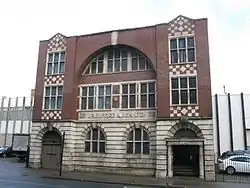| Ashford & Sons | |
|---|---|
 The factory's frontage in January 2013 | |
| General information | |
| Status | Empty |
| Type | Factory |
| Address | 16-18 Great Hampton Street |
| Town or city | Hockley, Birmingham |
| Country | England |
| Coordinates | 52°29′22″N 1°54′27″W / 52.4894°N 1.90751°W |
| Completed | 1912 |
| Technical details | |
| Material |
|
| Design and construction | |
| Architect(s) | Arthur McKewan |
| Designations | Grade II* listed |
The former Ashford & Sons factory in Birmingham, England is a Grade II* listed building in Arts & Crafts style.[1]
The factory, at 16-18 Great Hampton Street in the city's Jewellery Quarter, in the Hockley district, was designed by local architect Arthur McKewan and completed in 1912.[1]
It was given Grade II* listed status in 1982, protecting it from unauthorised development or deletion.[1][2] The list entry describes it as:[2]
A particularly sensitive formal elevation to a jewellery works, containing Birmingham Arts and Crafts with Edwardian Baroque details all executed to a very high standard.
In June 2016, plans to convert the then-empty building into 64 one-bedroom, 77 two-bedroom and six three-bedroom residential apartments were announced.[1]
Ashford & Sons
John Ashford was a gilt toy maker ("toy" meaning small items like buckles and buttons, not children's playthings) in Birmingham from 1842.[1] In 1905 he sold the business to Joseph Aitken.[1] The firm, which made enamelled objects and men's jewellery, closed in 1980, but its name is still shown, carved in Portland stone on the building's frontage.[1]
References
- 1 2 3 4 5 6 7 Jones, Tamlyn (6 June 2016). "Conversion plan for old Ashfords factory in Jewellery Quarter". Birmingham Post. Retrieved 6 June 2016.
- 1 2 Historic England. "Details from listed building database (1075540)". National Heritage List for England. Retrieved 6 June 2016.